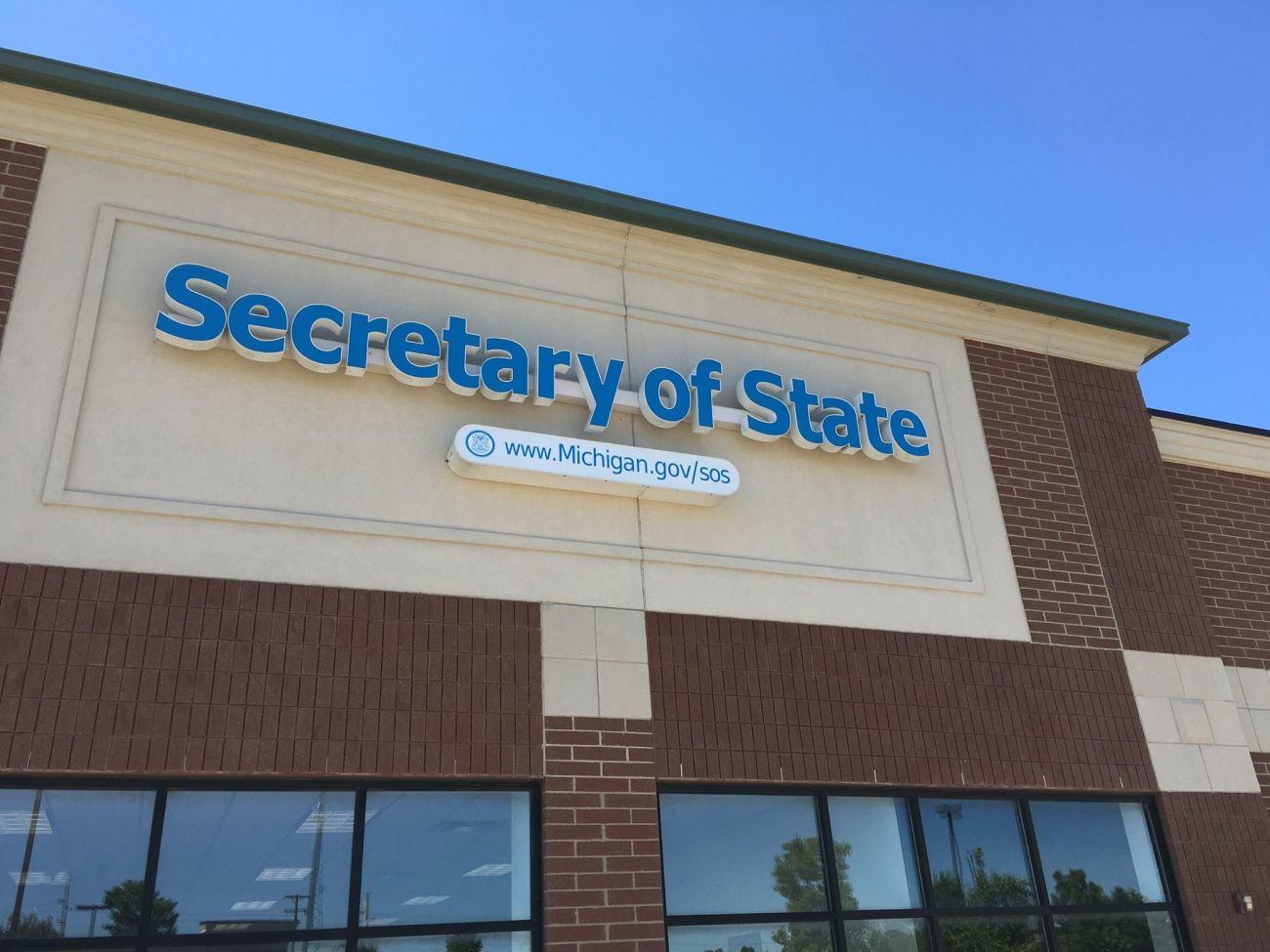At Michigan SOS, walk-up service does not mean you can walk in

LANSING—Amid continued customer complaints and confusion, Michigan Secretary of State Jocelyn Benson on Wednesday announced extended branch hours in an attempt to clear a pandemic-related service backlog by October.
But there is still no guarantee that “walk up” customers will be able to take a new photo for their driver’s license or complete other tasks that day, the first-term Democrat acknowledged during a media event in Detroit.
Customers who visit a branch office without an appointment can schedule one outside, but they’ll only be served that day if there are open time slots.
Related:
- GOP, Democrats agree: Return walk-ins at Michigan Secretary of State branches
- Michigan GOP to Secretary of State: Extend licenses, end appointment system
- As complaints mount, Michigan Secretary of State adds 350K branch appointments
“For the most part that will involve same-day operations, but someone may choose to come back later in the day or to come back another day” if an appointment is not immediately available, Benson told reporters.
Beginning July 19, SOS branch offices will stay open an extra hour — until 6 p.m. — on Mondays and Thursdays, Benson announced. And branches will also open an hour earlier — at 8 a.m. — on Tuesdays, Wednesdays and Fridays.
It’s the latest in a series of changes to the appointment-based system Benson implemented during the COVID-19 pandemic but plans to continue indefinitely.
Legislators have been urging Benson to resume “walk-in” service at SOS branches. Bipartisan majorities in the Michigan House last week approved bills that would require branches “allow for same-day transactions to be completed.”
But the current walk-up system already satisfies that requirement because newly hired greeters can help in-person customers schedule an appointment, Benson argued Wednesday. There’s no guarantee they’ll get same-day appointments, but it is possible if there are open slots.
“I'm confident that our plan, and the current model that we're operating under with our offices open and allowing a walk up, does comply completely with the legislative language,” Benson said.
But state Rep. Steve Johnson, a Wayland Republican who chairs the House Oversight Committee, accused Benson of misrepresenting the legislation, which has not yet been approved by the GOP-led Senate.
“It is very clear that it has to allow for someone to show up without an appointment to take care of a transaction,” Johnson told Bridge Michigan after Benson’s press conference. “The secretary of state has been opposed to our legislation from day one.”
The Secretary of State’s office told Bridge Michigan it was “neutral” on the amended version of the legislation that passed the House. Benson had opposed an earlier version approved by the Senate.
The new appointment-based system for SOS service has strained under pent-up demand from residents who delayed coming in for various services when offices were closed during the pandemic. Online booking has at times overwhelmed state servers, and months-long wait times have confused customers.
Under current protocols, Michigan residents must schedule an appointment for in-person services like applying for a first-time drivers license, renewing an expired ID photo, transferring a vehicle title or applying for a disability placard.
Branches open up new next-day appointments online at 8 a.m. and noon each day, but those time slots can be tough to come by in some areas, slowing down the state website and creating a new black market for appointment resales.
Last month, Benson announced a new initiative to have greeters stationed at each SOS branch office to help walk-up customers schedule an appointment, potentially on the same day if there are open slots, or at the next available date.
Benson said Wednesday that extending branch hours, as she plans to do later this month, will allow state workers to service an additional 120,000 Michigan residents through the end of September.
Residents will be able to apply for those additional appointments beginning each Wednesday at 2 p.m., according to Bensons’ office.
Johnson, the Wayland Republican, said he was happy to see extended hours, but he questioned why it took Benson so long.
“We were told that they needed $25 million in order to do so much of this, and we said ‘no, we're not just gonna throw money at you guys,’” Johnson said. “And lo and behold, they still found a way to make this happen.”
Benson had asked the legislature for additional funding to expand the hours of operation of branches, hire more staff, and pay overtime.
Democratic lawmakers, who are in the minority in both legislative chambers, filed a pair of bills that would have used federal stimulus dollars to fund part of Benson’s plan. But they have stalled.
Benson said Wednesday her department is delaying “other projects” and internal hires to pay branch staffers who work the extended hours. She also recently halved appointment allotments from 20 minutes to 10 minutes in an attempt to create 350,000 additional time slots statewide.
“I think that just shows you that the initial gut reaction from Secretary Benson is she wants a bunch of money, but when we didn't do it … they found a way to get the job done,” Johnson said.
Johnson and other legislative Republicans have been pushing Benson to open SOS branches for those without or unable to schedule an appointment, especially the elderly who may struggle to sign up online.
To a degree, the walk-up versus walk-in distinction is an exercise in semantics, Benson told reporters Wednesday.
“But there is a clear distinction” between her new service model and the “take-a-number-and-wait system” it replaced, Benson said, suggesting the new protocols will ultimately improve service after the pandemic backlog clears.
Previously, residents who walked into a secretary of state branch had “no certainty” as to when they might be seen, she said. Even the old appointment system, which she replaced, was “wildly inaccurate as to when someone could expect to have that service interaction,” Benson added.
“That's what this new model changes by allowing someone or inviting anyone to walk up to an office, and either be seen right away if there's space available, or be given an opportunity to return later that day, or wait for space to become available, or be given an opportunity to schedule another time in the near future.”
Residents who manage to get an appointment are provided “certainty that the office visit will take an average 20 minutes,” Benson said.
While lawmakers criticize her policies, Benson has argued that the Legislature contributed to the current backlog by allowing a pandemic-related grace period for expired driver’s licenses and registrations to end on March 31.
That meant everyone with an expired license or plate tag was suddenly subject to potential criminal penalties if they chose to continue driving while awaiting an SOS appointment.
Law enforcement agencies have been enforcing the law, but it’s not clear how rigorously or uniformly.
For example, from April 1, 2021 to June 8, 2021, the Kalamazoo Department of Public Safety issued 28 citations for expired plates, tags or licenses. That’s 41 less citations than for the same period of time in 2020, and 81 less than in 2019.
The legislation that sailed through the House last week with bipartisan support represents a compromise, Benson said.
It would extend licenses and registration tags that expired before August by an extra 120 days and waive any related late fees for customers. The bills would also require the Secretary of State provide “adequate in-person services” and allow for “same-day transactions.”
An earlier Senate version would have required branches to offer 8 hours a day of in-person service without an appointment, effectively ending Benson’s new system, but the GOP-led House did not sign off.
Benson argued the amended House language would not require her to make any changes to branch operations because walk-up customers already have the option of scheduling an appointment, potentially on the same day.
State Rep. David LaGrand, a Grand Rapids Democrat who has expressed a desire to see branch offices resume walk-in services, said he voted for the amended legislation because it was negotiated with Benson.
“Ultimately that’s language that the Secretary was comfortable with,” LaGrand told Bridge Michigan. “And if she's comfortable with something that has to do with her core mission, then I'm okay with it.”
But GOP legislators and advocacy groups accused Benson of trying to “rewrite history” and praising legislation she had opposed in an earlier form.
“Jocelyn Benson’s appointment-only policy and reduced hours are the primary cause of the current crisis at SOS branches, and her attempt to live in an alternate reality in which this isn’t the case is truly mind-boggling,” Eric Ventimiglia, executive director for Michigan Rising Action, said in a statement.
In addition to the extended branch hours Benson announced Wednesday, she noted fewer customers will need to visit branch offices moving forward because driver’s license and photo IDs are now good for 12 years instead of eight.
That change in state law took effect July 1. It may not be reflected on notices already sent out, but renewals that don’t require a new photo can be done online or in self-service stations installed across the state at 150 grocery stores.
And to give seniors access to Secretary of State services even if they are not technologically proficient, Benson said she’s had preliminary discussions with lawmakers about potentially launching new mobile offices that could travel directly to senior centers, places of worship or community gatherings.
“I want to be very clear about something: Since the day I took office, my team has been working night and day to solve these problems that have plagued this department for decades,” Benson said.
“We're still in the early days of post-pandemic operations, and we've got a strong plan here in place to provide an abundance of in-person opportunities for residents in the coming months.”
See what new members are saying about why they donated to Bridge Michigan:
- “In order for this information to be accurate and unbiased it must be underwritten by its readers, not by special interests.” - Larry S.
- “Not many other media sources report on the topics Bridge does.” - Susan B.
- “Your journalism is outstanding and rare these days.” - Mark S.
If you want to ensure the future of nonpartisan, nonprofit Michigan journalism, please become a member today. You, too, will be asked why you donated and maybe we'll feature your quote next time!




